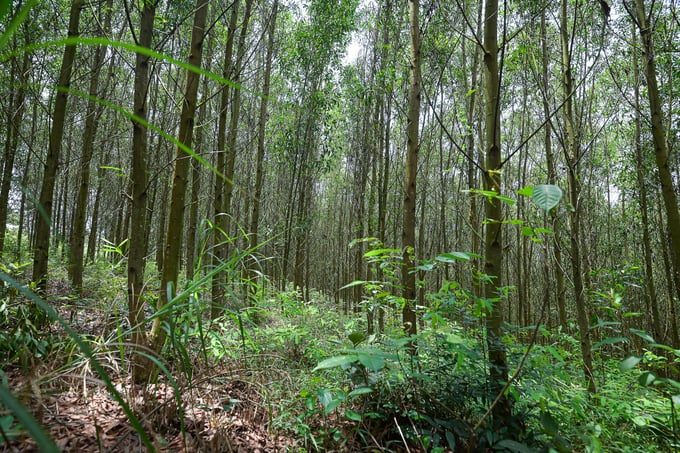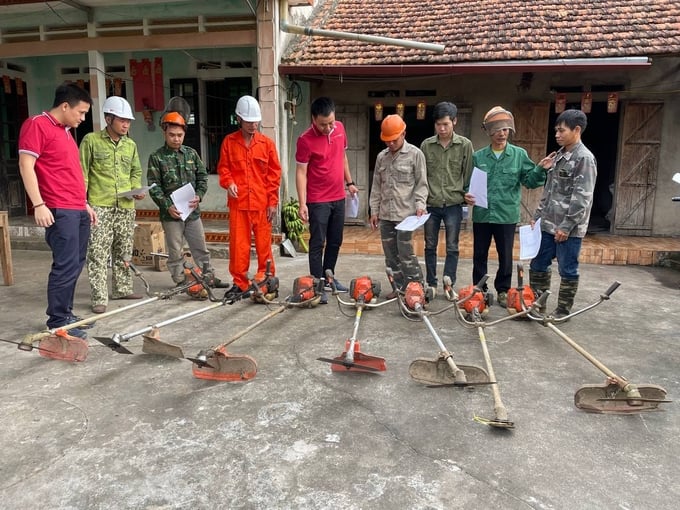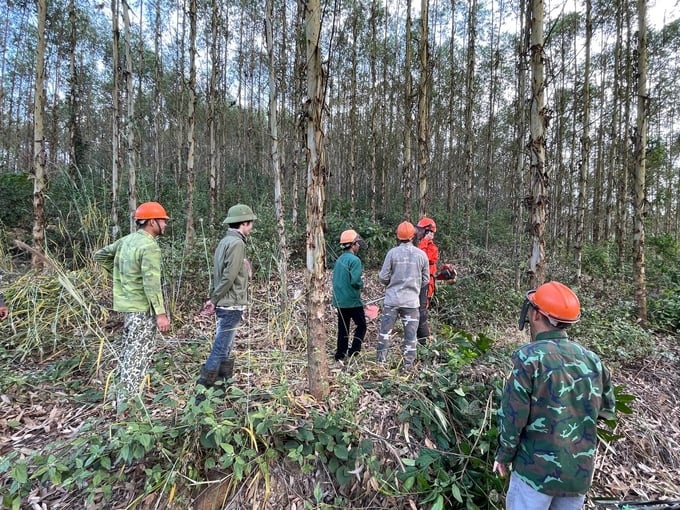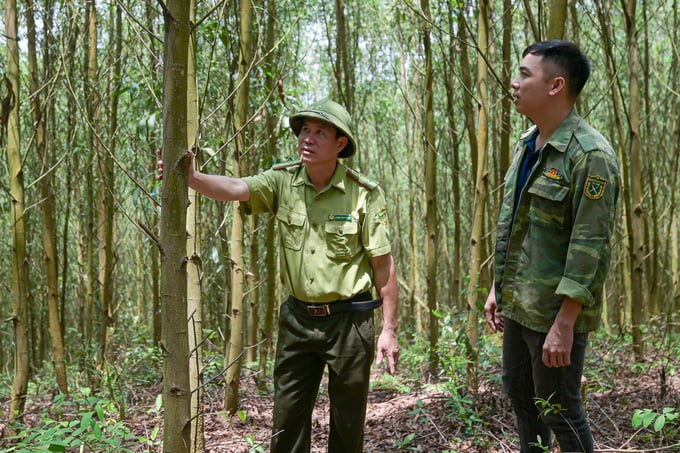May 29, 2025 | 22:54 GMT +7
May 29, 2025 | 22:54 GMT +7
Hotline: 0913.378.918
May 29, 2025 | 22:54 GMT +7
Hotline: 0913.378.918

The acacia forests are cultivated using new methods to meet the standards of sustainable forest management certification systems. Photo: Tung Dinh.
Currently, developing large timber forests, enhancing forest quality, and promoting sustainable forestry are the agricultural sector's main priorities. To meet these requirements, establishing certified sustainable forest management areas is essential to adapt to changes in import markets.
Headquartered in Hanoi, but with raw material areas spread across various northern midland and mountainous provinces, Smart Wood Vietnam Joint Stock Company operates in Luc Ngan district, Bac Giang province. In Luc Ngan, the company's raw material areas cover several communes including Tan Moc, Tan Lap, Kien Thanh, Dong Coc, Phu Nhuan, and Ho Dap, totaling 4,365 hectares for growing acacia and white meranti wood.
Mr. Nguyen Ba Duy, Deputy General Director of Smart Wood Joint Stock Company, mentioned that the company began establishing certified sustainable forest management areas since late 2022. This initiative stems from the need for stable wood supply, cost reduction, quality control, compliance with legal regulations, sustainable development, and meeting market demands.
Having a nearby raw material source helps reduce transportation costs, storage expenses, and other related costs, thereby enhancing the company's competitiveness in the market.
Developing certified sustainable forest management areas also enables the company to effectively control and ensure wood quality, ensuring that the final products meet high standards, have clear origins, and comply with customer requirements and export standards.

Employees of Smart Wood Company guiding local farmers on using machinery according to the standards of sustainable forest management certification systems. Photo: Tung Dinh.
Forests with sustainable management certificates will also adhere to legal regulations and environmental protection requirements. Currently, many countries have strict regulations on timber harvesting and forest conservation.
The goal of sustainable development is also highlighted in Smart Wood's development strategy. Accordingly, investing in wood sourcing areas is a part of their sustainable development strategy. This not only brings economic benefits but also helps businesses contribute to environmental protection, maintain biodiversity, and improve livelihoods for local communities.
Nguyen Ba Duy, currently serving as Vice Chairman of the Vietnam Timber and Forest Products Association, emphasizes that for any business, regardless of its development strategy, the most important goal remains meeting market demands and ensuring customer orders.
It can be seen that current consumer trends increasingly emphasize products with sustainable and transparent origins. Establishing wood sourcing areas with certified sustainable forest management helps businesses meet these requirements, build trust with customers, and enhance brand value.
Changes in techniques and management
According to Mr. Nguyen Ba Duy, in general, planting forests according to sustainable standards requires more investment in terms of finance, technology, and management, but it brings long-term benefits for the environment, society, and economy. Therefore, this is a sustainable and effective direction compared to traditional logging methods.
In resource management and environmental protection efforts, traditional logging methods often focus on maximizing timber yields in the short term, sometimes neglecting environmental protection, leading to soil degradation, water depletion, and biodiversity loss.
"Sustainable forest planting methods focus on soil and water conservation, as well as biodiversity preservation. These techniques include maintaining vegetation cover, protecting water sources, and preventing soil erosion," Mr. Duy added.
Previously, traditional logging methods may have lacked strict compliance with regulations, monitoring systems, and detailed reporting. In contrast, forests certified for sustainable management must adhere to rigorous standards concerning environmental, social, and economic aspects. This includes environmental impact assessments, forest management plans, and regular audits to ensure compliance.
Regarding biodiversity, traditional logging practices can lead to biodiversity decline due to inadequate environmental protection measures. Sustainable forest planting methods emphasize biodiversity conservation, including protecting endangered species, maintaining sensitive ecological areas, and employing mixed planting techniques to sustain ecological balance.

To meet sustainable forest management standards, there are not only changes in planting and care but also in harvesting techniques. Photo: Tung Dinh.
Regarding the use of Plant Protection Products (PPP) and pest management, previously forest owners often used chemicals, pesticides, and chemical fertilizers, leading to environmental pollution and negative impacts on human and animal health.
In contrast, sustainable forest management today typically restricts the use of chemicals and promotes natural biological control methods for pest management. Sustainable forest certification standards require minimizing the environmental and human health impacts of chemicals.
Traditional forestry practices often lack long-term planning, resulting in overexploitation and ineffective reforestation measures. Conversely, sustainably managed forests incorporate long-term plans, including sustainable harvesting, reforestation, and restoration of previously exploited areas. These plans aim to ensure that forest resources are maintained and sustainably developed over generations.
The fundamental difference lies in traditional forestry practices often lacking systematic monitoring and periodic evaluation systems, leading to difficulties in detecting and addressing environmental and social issues. In contrast, sustainable forest management requires continuous monitoring and evaluation of forest activities to ensure compliance with standards and timely adjustments if necessary. These activities are typically carried out by independent certification organizations.
For long-term benefits
Born in 1995, Mr. Vu Mac Tuan Ngoc (Chu town, Luc Ngan district, Bac Giang province) currently owns over 10 hectares of forest certified with both FSC and VFCS/PEFC sustainable forest management certifications. This achievement is the result of collaboration between Mr. Ngoc and Smart Wood since 2022.
Mr. Vu Mac Tuan Ngoc, born in 1995 and residing in Chu town, Luc Ngan district, Bac Giang province, shares the challenges of transitioning from conventional forestry practices to meeting sustainable forest management certifications. He states, "The first challenge for forest owners is the increased investment costs to improve infrastructure and equipment to meet certification standards. For example, ensuring occupational safety, using chainsaws, grass cutting equipment, and establishing access roads during harvesting to protect the environment, prevent erosion, and landslide hazards."

Mr. Vu Mac Tuan Ngoc (right) along with a district forest ranger inspecting the acacia forest certified for sustainable forest management standards. Photo: Tung Dinh.
According to Mr. Ngoc, the second challenge lies in meeting monitoring and reporting requirements. Evaluation agencies require more detailed reports, posing certain difficulties in completing procedures and paperwork.
However, despite these initial challenges, this forest owner acknowledges the long-term economic benefits. For instance, certified sustainable forest products often fetch higher prices and are favored in international markets.
Moreover, obtaining sustainable certification enables access to premium markets that demand strict standards, thereby enhancing business opportunities for forest owners. Transitioning to sustainable management practices with new technical measures promises stable and sustainable income sources, ensuring livelihoods for families and improving long-term living conditions.
Additionally, sustainable forest management helps protect forest resources and maintains the vitality of forest ecosystems. This not only benefits forest owners but also preserves natural environments and conserves resources for future generations.
Translated by Mai Quang Huy

(VAN) Ms. Nguyen Thi Dung, Deputy Director of Ngoc Hoang Cooperative, shared about the journey of bringing dragon fruit to Europe, achieving annual revenues in the billions of VND.

(VAN) Bamboo products from Thang Tho Bamboo Cooperative have reached many countries around the world, while also creating jobs for local workers.

(VAN) The Management Board of Con Dao National Park reported that a green sea turtle, tagged in the Philippines, has traveled thousands of kilometers to lay 84 eggs on Bay Canh Islet.

(VAN) Green technology is paving a new path for sustainable aquaculture in the Mekong Delta in particular and across the country in general, helping reduce emissions and adapt to climate change.

(VAN) On May 27, La French Tech Vietnam (the French startup and innovation community in Vietnam) held the French Tech Summit Vietnam 2025.
/2025/05/27/4731-2-223159_980.jpg)
(VAN) No votive paper, no styrofoam, no plastic bags, no plastic bottles, and no single-use plastic trays are the key rules tourists should keep in mind when visiting Con Dao.

(VAN) In the fight against plastic pollution, Vietnam has been demonstrating a proactive, pioneering, and active role in addressing the greatest environmental challenge today.